Share
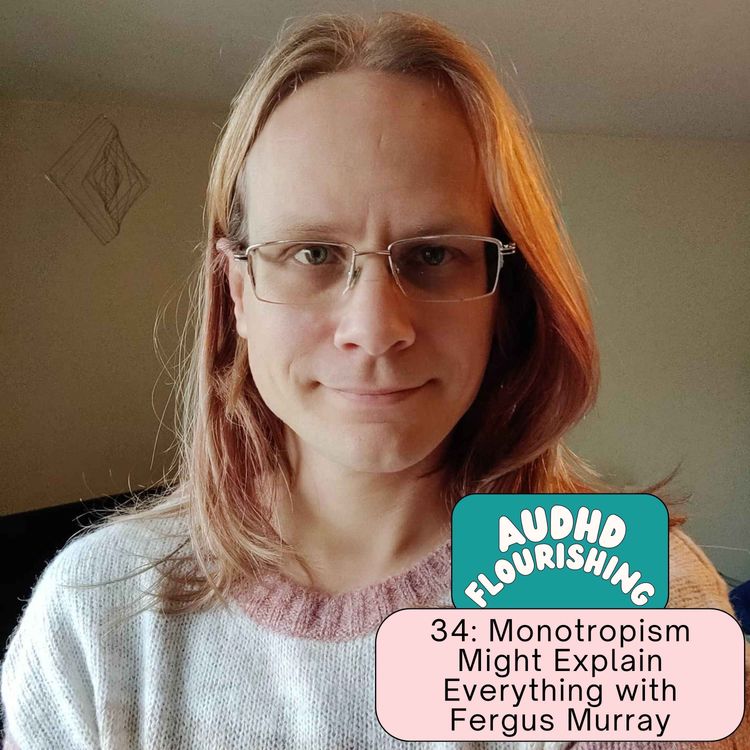
AuDHD Flourishing
34 Monotropism Might Explain Everything with Fergus Murray
Monotropism is a powerful description of a narrowed field of attention and interests that, for many, explains much of the autistic experience. Fergus Murray (they/them) shares about this topic both from personal experience, and as the child of Dinah Murray, one of the people who developed the term and theory.
Healing from neurodivergent burnout requires understanding your monotropic brain and avoiding monotropic split as much as possible. And fun fact, as Fergus points out: in the original validation study, AuDHD people were the most monotropic!
The title reflects both monotropism as an excellent theory about potentially multiple neurodivergences, as well as the tendency of monotropic people to end up seeing connections between diverse fields.
- Fergus's website: oolong.co.uk
- Monotropism Questionnaire
- Autism and Mental Health free course (free for first 90 days)
Fergus's LinkTree: https://linktr.ee/0olong
Monotropism: https://monotropism.org
Resources:
- Like Your Brain community space
- Resources Blog
- Transcript Doc
- Email Newsletter
More episodes
View all episodes
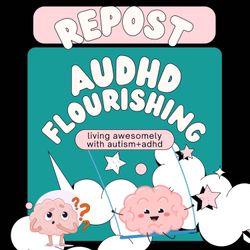
Your Core Self-Care Need - Repost
10:02|Most people have one or two core self-care needs that, if they're met, everything else feels easier. This episode is about how to figure out yours... and what to look out for when you hear people preaching about their own!There's also acknowledgment that your neurodivergent body and brain may process things in different ways, so the following questions may not be that useful for you.Figuring out your core self-care need or needs (just a jumping-off point!): Thinking back to times in your life when things felt the easiest, what was your life like? Which of your needs were being met fairly well?When life has been a bit easier or better, did you notice any particular ups and downs based on particular needs being met? For example, if you were overall feeling pretty good compared to your baseline, was there anything that particularly threw you off? Or something that could bring you back to that feeling better pretty quickly?Tuning into your body right now, is there anything your body is asking for? This won't necessarily be a core need, it's more a check-in to see what messages your body is already good at giving you.Thinking about the past few days, weeks, or months, are there any messages your body has been consistently giving you? For example, when you've felt tired, does it feel more like you need sleep, or more like you need food, or more like you need to be around another person to recharge? Again, this isn't a perfect metric, just noticing how your body talks to you.Is there any form of self-care that feels like it REALLY fixes a bad day?Resources mentioned: Takedown of Why We Sleep: https://guzey.com/books/why-we-sleep/Commentary on the above post: https://statmodeling.stat.columbia.edu/2019/11/18/is-matthew-walkers-why-we-sleep-riddled-with-scientific-and-factual-errors/Transcript DocAnd one more link someone sent taking down the book Why We Sleep (I haven’t listened to this episode but the links alone look great): https://open.spotify.com/episode/4r0Vawq8xAfnsnKbYVUNhc?si=n7t-koeuS2GXQ2QnA8j4dQAuDHD Flourishing resources:Transcript Doc Mattia's NewsletterLike Your Brain community space (Patreon/Discord)Repost of ep 11, originally published Aug 18 2023
130 Unclear Discomfort
11:54|it is what it isAuDHD Flourishing resources:Transcript Doc (often a few weeks behind, but we do catch up!)Mattia's NewsletterLike Your Brain community space (Patreon/Discord)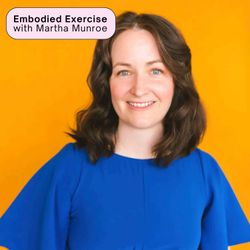
129 Embodied Exercise with Martha Munroe
01:03:04|Martha Munroe, a neurodivergent personal trainer, was noticing patterns in the ways her clients talked about exercise and their bodies. They were often driven by external goals (aesthetics, performance, what others think) vs. the internal experience of movement.She reframes exercise as a way to explore and express through embodiment. Also, reclaiming exercise (not only movement) by offering gentle structure if desired.I loved her book, Attuned Exercise!Connect with Martha: Attuned Exercise websiteMartha's Instagram, @attunedexercisemarthamunroe.comAlso mentioned in episode (book I'm reading): Girl on Girl: How Pop Culture Turned a Generation of Women Against ThemselvesAuDHD Flourishing resources:Transcript Doc (often a few weeks behind, but we do catch up!)Mattia's NewsletterLike Your Brain community space (Patreon/Discord)book links are affiliate links
128 AuDHD Parenting
24:38|Parenting as an AuDHDer is challenging and misunderstood. Many parents I speak to are near or in burnout at any given time, especially if they had kids before discovering their neurotype (which is common). This episode is based not on my experience as a parent, but my experience having spoken and heard from many AuDHD parents, and what I see working for them.This is in part a follow up to last week's interview with Julie M GreenMentioned in episode:Book Good Inside by Dr Becky Kennedy* (and her Instagram)AuDHD Flourishing resources:Transcript Doc (often a few weeks behind, but we do catch up!)Mattia's NewsletterLike Your Brain community space (Patreon/Discord)*affiliate link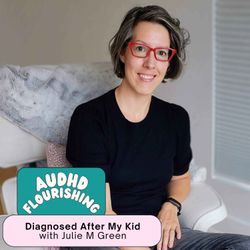
127 Diagnosed After My Kid with Julie M Green
55:48|Julie M. Green is the author of Motherness: A Memoir of Generational Autism, Parenthood, and Radical Acceptance. She shares about how difficult early parenthood was, how different her autism presents versus her kid's, and navigating school and regulation skills.The book is a vulnerable look at some of the challenging and lighthearted moments of raising an autistic kid.Connect with Julie:Her book Motherness: A Memoir of Generational Autism, Parenthood, and Radical Acceptance Website: juliemgreen.caInstagram: https://www.instagram.com/juliem.greenSubstack: https://theautisticmom.substack.com/AuDHD Flourishing resources:Transcript Doc (often a few weeks behind, but we do catch up!)Mattia's NewsletterLike Your Brain community space (Patreon/Discord)*affiliate link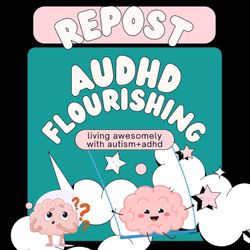
Surviving Out of Spite - Repost
13:03|You deserve to survive this. Please stay.And if staying out of spite helps you, it has gotten me through some tough times.My Medium article, "Please Stay, We Need You"Repost of ep. 75Crisis Resources:USA-based anonymous crisis chatInternational crisis linesVarious types of crisis resources in about 10 countriesResources:Transcript DocEmail NewsletterLike Your Brain community space
126 Slow Days Make Flow Days
23:08|Flow is pleasant and often productive. It may also require some guardrails to be healthy for AuDHDers, especially those of us on the very monotropic side. It's often easy for us to get into flow and hyperfocus, and to stay in them until they stop feeling pleasant.Adding in more rest and recovery, including preparatory rest as needed, can really help!It's also okay to avoid flow states for a period of time, as I am right now for the most part.Do Less program for 2026 (starts Jan 15, reach out by Jan 7)Email mattia@mattiamauree.com with application answers, and/or any questionsAuDHD Flourishing resources:Transcript Doc (often a few weeks behind, but we do catch up!)Mattia's NewsletterLike Your Brain community space (Patreon/Discord)
125 Autistic Play Saves Lives with Max Alexander
58:54|Max Alexander is an artist and play worker who has mapped some common shapes of autistic play. He's passionate about neuro-affirming play for all ages.Play is both a healing tool, and can help prevent some of the effects of trauma (we touch on this lightly, a concept I learned from Linda Thai) One possible way to apply the play styles is noticing which ones speak to you, and which ones you're already engaging in, then leaning into those.The ebook is free, and it's a quick and excellent read!Apologies for the audio quality. Max was using a headset and didn't have an actual microphone, so I did the best I could to clean it upDo Less program for 2026 (starts Jan 15, reach out by Jan 7)Email mattia@mattiamauree.com with application answers, and/or any questionsConnect with Max:Max's book, The Joys and Shapes of Autistic PlayMax's Substack, Play RadicalAuDHD Flourishing resources:Transcript Doc (often a few weeks behind, but we do catch up!)Mattia's NewsletterLike Your Brain community space (Patreon/Discord)
124 AuDHD Leadership Matters
16:27|AuDHD leadership touches on last week's interview with Dr Megan Anna Neff. And it goes beyond the visible leadership of creating content, or being in the public eye.AuDHD leadership can includebeing your authentic selfvisibly meeting your sensory needssharing what helps you (whether or not it's advice)Mentioned in episode:- Do Less program for 2026 (starts Jan 15, reach out by Jan 7)Email mattia@mattiamauree.com with application answers, and/or any questions- Blog post with business episodesAuDHD Flourishing resources:Transcript Doc (often a few weeks behind, but we do catch up!)Mattia's NewsletterLike Your Brain community space (Patreon/Discord)